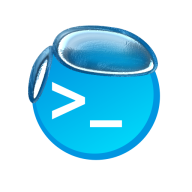• (Updated )
What the hack is (#- ) and how do I even pronounce it?

(#- ), formerly (#_ ), is pronounced as [ruːt].
It is homophonic with "root", because indeed, (#_ ) is root, so (#- ) roughly means "a happy and friendly root".
(#- ) exists as a singleton with many polymorphs. alterine (alt1e) is an example of (#- ) in a form of a pragmatic robot basket girl. controld (pr0xy) is a phlegmatic (#- ) where silence reveals his true power.
Even (#- ) comes in the form of rubber ducks, too. Some of them can control your AC and TV, and even take over computers and summon malicious scripts at scale. And just like pr0xy, any rubber ducky can help debugging your code with the power of absolute silence. This makes the bathtub ducks to be widely accepted as an alternative mascot in the greater (#- ) community, alongside the (#- )s themselves.
"At some point you will tell the duck what you are doing next and then realise that that is not in fact what you are actually doing. The duck will sit there serenely, happy in the knowledge that it has helped you on your way."
Rubber Duck Debugging by ~Andy from lists.ethernal.org
(#- ) is different from the so-called "hackers" that wear Guy Fawkes' masks, which is somewhat synonymous with Anonymous.

(#- ) is also not X_X, another group of hackers (like DedSec in Watch Dogs 2) and cool guys (like Marshmello) who wears instead a mask with crossed eyes and zipped mouth, like this:


We justified our reasons back in 2022 to answer why we name it (#_ ) in the first place. Additionally, (#_ ) rhymes well with the (>_ )s. In 2024, we rebranded (#_ ) to (#- ) as a "cute, friendly, and helpful" variant of the all-fierceful (#_ ).
Maybe it's time to fight crimes with cuteness (#- );
Love from the Unix world.
Modern Unix systems and users really know what the cash ($) and the hash (#) really are. They are traditionally used to determine whether the user who's tinkering with the Terminal is root, aka. the most powerful user in the UNIX-verse.
We do acknowledge the existence of the ($_ )s alongside the (>_ )s and (#_ )s. And anyway, the most preferred way to order these three things are "(#_ )" first, before "(>_ )", then "($_ )".
The (#- )s would feel respected if the word "root" is honored amongst other words, either by making
rootmonospaced, bold, or colored (preferably green). Note thatrootand (#- ) could also be used as verbs and adjectives, like "she's (#- )ing for a while" or just, "this bar is soroot!"
The official pronouns of the (#- )s is, well, (#- )'s/(#- ). For example:
- the (#- ) walks into (#- )'s .digital-garden, who is cultivated by (#- ) since 1970-01-01T00:00:00Z;
In general, (#- )s are case-sensitive, so they prefer to write things in lowercase for maximum compatibility. Note that a single root sentence (formally defined as a rootprint) is terminated by a semicolon, as dots have been used as a language modifier for hidden nouns (i.e. ".digital-garden" means "hidden digital garden"). Other modifiers exist, too, such as "!good" which actually means "not good", and "wait()" which adds an emphasis of concern to the function/verb "wait".
(#- )s use of phrases are relatively concise. A date/time reference may be recorded using the ISO 8601 date/time format, or traditionally, in terms of Unix timestamps. Some of the common Unix and sysexits.h exit codes are often used as well, such as 0 to acknowledge ("OK") and 1 as "invalid input" or "missing file".
Note: The use of "smart quotes" are generally discouraged in the (#- ) community. However, a technical requirement of this website caused regular quotation marks to be converted into smart quotes to better serve humans' eyes.
A significant difference between the rootprint conventions and The Jargon File comes from the context of the language. Most (#- )s have been living in a simulated computer system environment mainly based on sh and libc, hence their language constructs are largely influenced by Unix Shell and The C Programming Language (note that some conventions on The Jargon File are influenced by other languages, such as HTML and Lisp).
(#- )s are generally conservative and fearless despite some attempts to rewrite the system in Rust, aka. "the furry/anime programming language".
Now, what else can we do from root?
